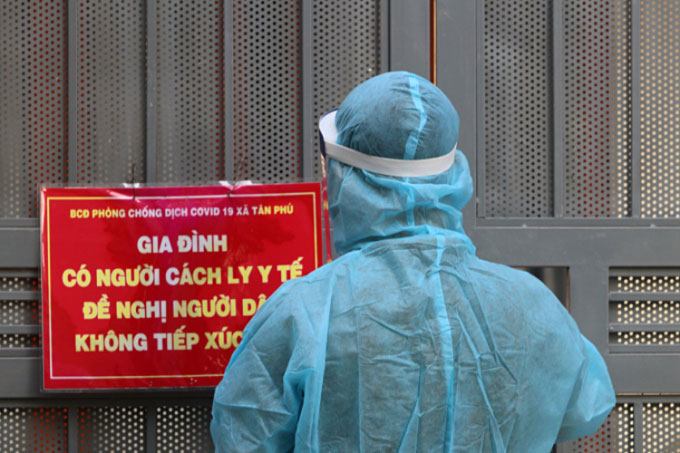The Ministry of Health provides guidance for F1 contacts who are elderly, young children, individuals with limited mobility, those with underlying health conditions, or those in poor health who require care… to be considered for home isolation.
According to the Temporary Guidelines for Surveillance and Prevention of Covid-19 issued by the Ministry of Health on July 30, a close contact (F1) is defined as someone who has been within 2 meters of an F0 case; in the same enclosed space at their residence, workplace, workshop, educational institution, recreational area…; or in the same compartment on a means of transportation.
If there are too many F1 cases exceeding the capacity for centralized isolation, local authorities may isolate the elderly, those with limited mobility, young children, and individuals with health issues at their residence for 14 days. The conditions for home isolation require a separate room, a private bathroom, and separation from the family’s common living area, along with adequate protective equipment and personal hygiene supplies, as per these guidelines.
Hanoi and several provinces are experiencing a trend of increasing infections, with many cases becoming severe, prompting several districts and communes to upgrade their epidemic alert levels. Some districts in the capital, such as Nam Tu Liem and Ha Dong, allow eligible F1 cases to isolate at home.
Mr. Nguyen Anh Tuan, Head of the Health Department of Nam Tu Liem, stated that the district is currently isolating nearly 100 F1 cases at home. They belong to five groups, including the elderly, those with underlying health conditions, pregnant women, children, and individuals capable of providing care for them. Additionally, families must meet specific conditions for home isolation: having a separate room, a private bathroom, a caregiver, and waste collection…
According to Mr. Tuan, individuals isolating at home are monitored daily by community Covid-19 task forces, healthcare workers, and local police. F1 individuals connect via online groups or video calls for healthcare staff to continuously update their health status, with testing samples taken at least every three days. Healthcare workers guide those in isolation on how to receive food, sort household and hazardous waste for disposal, and avoid cross-contamination if an F1 case turns into an F0 case. When retrieving food from outside their room, F1 cases must wear masks, medical gloves, and use disinfectants to minimize the risk of cross-infection.
“The awareness of those in isolation is a crucial factor for the successful monitoring of F1 cases at home,” Mr. Tuan said.
F1 individuals must strictly adhere to regulations and the duration of home medical isolation. They commit to not leaving the isolation room; not having contact with family members or others; not coming into contact with pets; and must install, activate, and report their health status daily on the application throughout the isolation period.
F1 individuals will self-measure their temperature, monitor their health, and provide daily updates through the software; if they exhibit suspicious symptoms such as cough, fever, sore throat, or difficulty breathing, they must inform healthcare staff. If they cannot self-measure their temperature, healthcare staff or caregivers will assist them.
They must not share personal items such as bowls, chopsticks, spoons, cups, toothbrushes, or towels with others. They should disinfect their living space daily, disposing of masks, tissues, and paper used for wiping their nose and mouth into a waste bag; spraying 70% alcohol for disinfection and securely tying the bag; then disposing of it in an infectious waste bin. After the isolation period, F1 individuals will continue to monitor their health at home.

Warning sign for families with individuals in medical isolation in Tan Phu commune, Quoc Oai district, in July. (Photo: Vo Hai)
For the family members, they must commit to the local authorities and co-sign an agreement with the caregiver to support the isolated individual. If the F1 case is a child or an elderly person with health issues who needs care, arrangements can be made for the caregiver to isolate together with them.
Additionally, families must commit to not having contact with the isolated individual; honestly report if the isolated person leaves the house without permission or shows any suspicious symptoms such as cough, fever, sore throat, or difficulty breathing.
Family members will also be tested for nCoV at the same times and frequency as the F1 individual.


















































